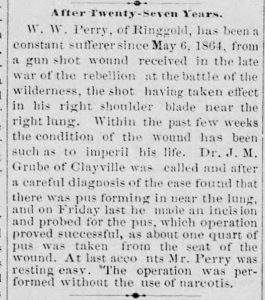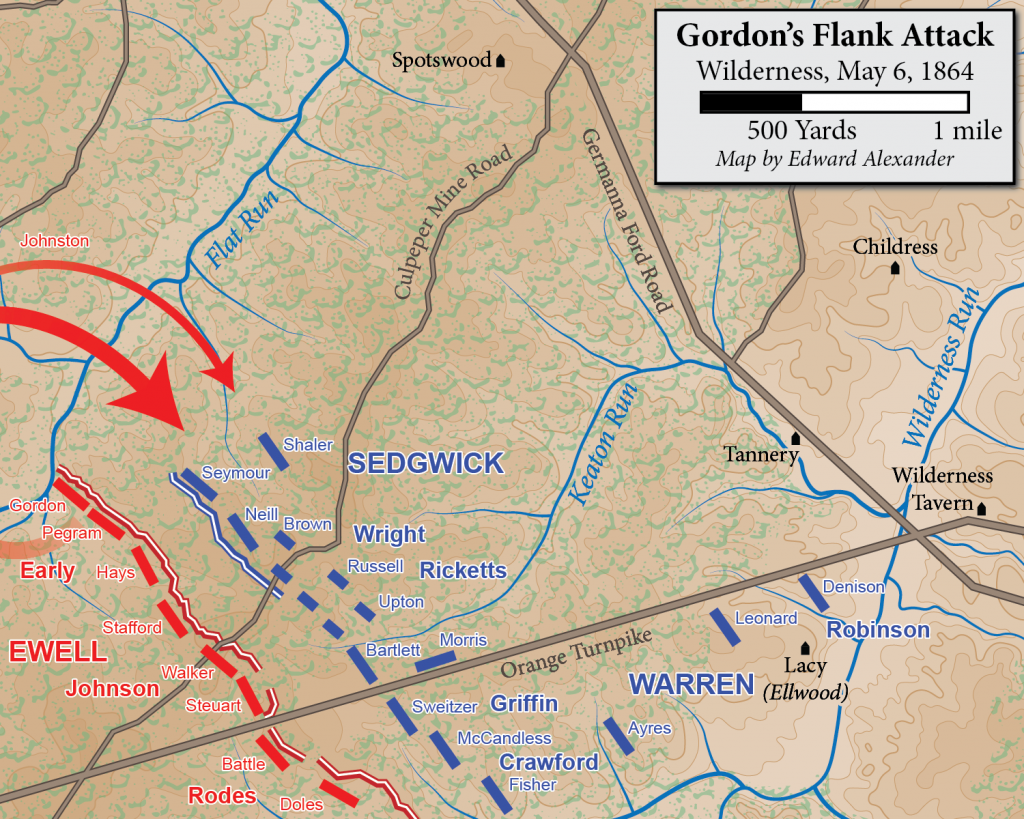“Boys like me should have been at home with their mothers”: Private William Perry at the Wilderness

William Wallace Perry did not stand an imposing figure on a battlefield like his namesake. The fourteen year old barely fit into the uniform he was assigned. It is unclear how the youngster managed to escape detection when he joined the army. As a historian I’m grateful he did, as William kept a fantastically detailed diary during his time in the Union army.
In early 1864, Perry enlisted into the 82nd Pennsylvania Infantry. The unit was still guarding prisoners at Johnson’s Island when Perry arrived in Virginia, so he was temporarily attached to Joseph Hamblin’s 65th New York Infantry in Alexander Shaler’s Sixth Corps brigade. He saw his first combat with them on May 6th at the Wilderness. Perry detailed the confusion within the Sixth Corps when John Gordon’s flank attack struck them that evening.
We left our camp this morning about 3 o’clock and march toward the battlefield. As it is dark we cannot tell what kind of country we are in. We march along quietly and pass regiments camped along the road. About daylight we come out on the plank road and from the evidence around us we are near the battlefield. We halt for a short rest and a number of ambulances loaded with wounded pass us. We move up on the road. The air is full of smoke and a great smell of burnt powder. We leave the road and strike off into the woods and form line of battle and soon hear the zip zip and see our comrades fall.
As soon as formed we move up to support an Ohio regiment to repulse a charge. We hear the old Rebel Yell and they come as though they meant business. The Ohio boys receive them in good shape and they go back in disorder. For a time we have some rest and have time to eat our breakfast. Our officers now rearrange our line and our brigade moved up in the front line. Shaler’s brigade has the right of the whole line. There is one regiment on our right flank. I think it is a Maryland regiment. Our line is formed as follows 65th, 122nd, 67th New York, with our detachment with the 65th New York. Seymour’s brigade on our left.
The whole line is ordered forward. We move through woods, swamps, and underbrush and have a hard time to get through. We advance I presume two miles this way, the Rebels falling back. Our line is halted and our company is sent out as skirmishers. We go out in front but the woods are so dense that we can see but a short distance in front. The Rebel sharpshooters keep us dodging bullets all the time. We think we see the enemy massing for a move of some kind and so report to the commander but he takes no measures to repulse the attack. It seems to be that the Rebels are marching around our right and will attack us in the rear.
Now the Rebels are on the move, they seem to be sure for they have no skirmishers but come right on. We fire into them but it don’t check them in the least. They come right along and we fall back to main line. After joining main line we continue to fall back to our first position when we come in contact with Rebels coming upon our rear. We stop and fire in both directions. The Rebels pour volley after volley into us and our men are falling fast all around us. A number have been killed, wounded, and missing. It is now nearly dark.
Just now I notice Gen. Shaler surrender, also Gen. Seymour. Williams has been captured. [James M.] Burdick, [George J.] Smith, Reily, Smathers, George and myself are wounded.
I am shot through right shoulder. In retiring from field I was confused as well as the officers. Col. Hamblin asked me where I was going. I told him to the rear. He said not that way for back there were Rebels. He said boys like me should have been at home with their mothers. I tell him I will get through alright.
After some time I find my way out to the plank road but the way the balls flew was awful. At the Field Hospital the surgeon refused to dress my wound saying that I was wounded unto death and no use to pay any attention to me. I shall do the best I can for myself but there is a lot of wounded men here and I don’t know how I will come out but shall try and come out on top of the wound. I gave my haversack to Comrade Burdick and he is not here so I have nothing to eat. The men who brought me to this place lay me on a stretcher to sleep but I can’t sleep. My wound bleeds and hurts me too much for that. Some person gives me a little beef tea to drink, if I only had more.

It is now 10 o’clock and the Rebels are shelling the Hospital and we will have to get out of this. The musketry is drawing nearer. I think I should of felt better had the surgeons made an effort to dress my wound. Oh what suffering and misery there is here. All is confusion and moving around in haste. Some time during the night I am loaded on an ambulance with a man of the 5th Maine and leave the Hospital. During this night I suffer untold pain. We have a couple of blankets and if it was not for the fast driving I could sleep some. We lost a great many men out of or Corps today. Of one thing I am sure, that I did not run today until I was ordered to. That was a wonderful charge of the Rebels. The army seems to be on the move for some other place for men are marching in along on which we are traveling.
Perry survived and spent the rest of the year in northern hospitals. He returned to the Army of the Potomac in December. His wound troubled him for the rest of his life, as noted in an 1891 article, but he lived until 1913.

I should note that Perry’s manuscript is not a pure diary. The version preserved by the J.Y. Joyner Library at East Carolina University in Greenville, North Carolina is a notebook into which rewrote his own journal later in his life. Thus, he may have made some editorial changes. I’ve typed my way through the entire manuscript myself and haven’t found anything suspect in his writing. The minutiae is reliably accurate and contain details suggesting the near-majority was written during the war. Perry included a few recollections as well at the end of the notebook and would also contribute several articles for the National Tribune. The teenager’s writing is a great resource for the last year of the Civil War.

Very interesting. I’ll read it again.
I love the snippets from the primary sources!
Interesting read; thanks.
Very interesting! I live in a house built in 1911 and met a woman who lived here as a child. The house belonged to her grandparents and she told me the following: Her grandfather, William Dayton, was in the Civil War and was in the 65th NY. He, too, was wounded at the Wilderness. He was in a wagon with 12 other wounded men and he was the only one who survived.
I have done some research on William Dayton. He was, like William Perry, in the 82nd PA. Interesting that his granddaughter told me he was in the 65th NY. Dayton also enlisted in 1864, although he was older than Perry. Dayton was shot through the right lung, and died in 1920 in Orange, CA.